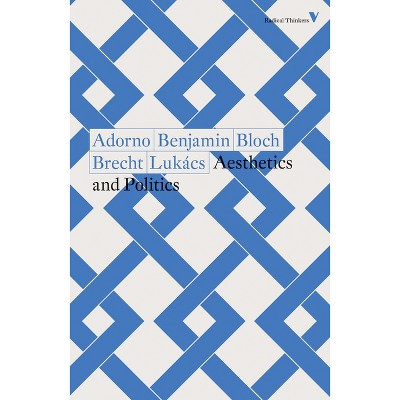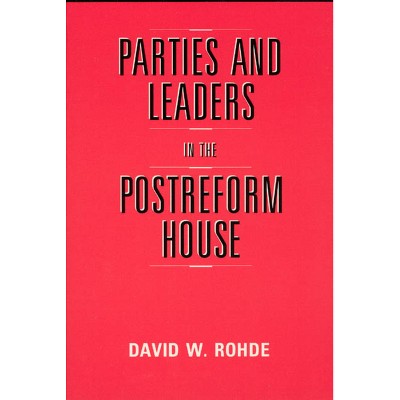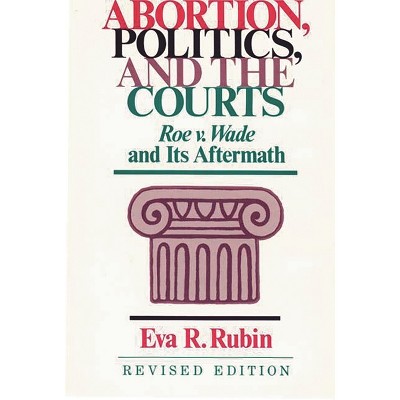Sponsored

Divided Parties, Strong Leaders - (Chicago Studies in American Politics) by Ruth Bloch Rubin
In Stock
Sponsored
About this item
Highlights
- Drawing on nearly a century of legislative history, this careful account invites readers to think anew about when, why, and how leaders of divided parties wield power in Congress.
- About the Author: Ruth Bloch Rubin is associate professor of political science at the University of Chicago.
- 240 Pages
- Political Science, Political Process
- Series Name: Chicago Studies in American Politics
Description
About the Book
"For decades, legislative scholars have viewed divided parties as a critical constraint on congressional leadership. The more a party's rank and file agree with one another, the stronger their leaders are predicted to be; as member preferences diverge, leader power is thought to diminish. In a powerful corrective to this received wisdom, Ruth Bloch Rubin argues that party divisions are not inherently limiting. In defense of this thesis, Divided Parties, Strong Leaders highlights variation in how members of party factions choose to work together. Bloch Rubin shows that leaders of divided parties will exercise power most forcefully when the collaborative efforts of their coalitions' competing factions are evenly matched. By contrast, their capacity to exercise power is more limited when one faction has out-collaborated its competition. Presenting detailed case studies of some of the most storied leaders of the postwar Congress, including Speakers Sam Rayburn and Nancy Pelosi, the book's empirical chapters explore the factional configurations these leaders encountered and their consequences for how forcefully they wielded power"--Book Synopsis
Drawing on nearly a century of legislative history, this careful account invites readers to think anew about when, why, and how leaders of divided parties wield power in Congress.
For decades, legislative scholars have viewed party divisions as critical constraints on congressional leadership. The more a party's rank and file disagree with one another, the weaker their leaders are predicted to be; as member preferences converge, leader power is thought to increase.
In a powerful corrective to this prevailing view, Ruth Bloch Rubin argues that party divisions are not inherently limiting. Divided Parties, Strong Leaders highlights and examines variation in how members of party factions choose to work together. She shows that leaders of divided parties are well positioned to overcome, and even draw strength from, their divided ranks when the collaborative efforts of their coalitions' competing factions are evenly matched. By contrast, their capacity to get what they want is more limited when one faction has out-collaborated its competition. Presenting detailed case studies of some of the most storied leaders of the postwar Congress, including Speakers Sam Rayburn and Nancy Pelosi, Bloch Rubin analyzes the factional configuration each leader encountered and explains why it mattered for their exercise of power.
Review Quotes
"Divided Parties, Strong Leaders fundamentally challenges decades of political science research about congressional leadership power. Bloch Rubin demonstrates that leaders can wield significant and impactful influence--not merely in spite of divisions within their party, but often because of them. The context a leader navigates plays a role in shaping their power, but not in the simplistic ways we thought."--James Curry coauthor of "The Limits of Party"
"Bloch Rubin makes a strong case that--contrary to prevailing wisdom--divided legislative parties can sustain strong party leaders. What matters, Bloch Rubin argues, is whether internal party factions are symmetrically organized (empowering leaders to exercise power despite divisions) or asymmetrically organized (limiting leaders' capacity in divided times). Divided Parties, Strong Leaders is a stellar work that challenges the conventional wisdom of Congressional scholars about the conditions that foster strong party leaders, speaking to contemporary leadership difficulties on Capitol Hill."--Sarah Binder author of "Stalemate: Causes and Consequences of Legislative Gridlock"
About the Author
Ruth Bloch Rubin is associate professor of political science at the University of Chicago. She is the author of Building the Bloc: Intraparty Organization in the U.S. Congress.Shipping details
Return details
Trending Non-Fiction











